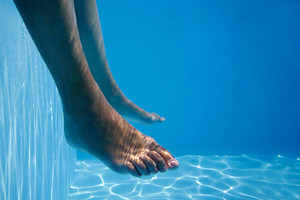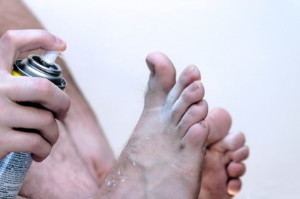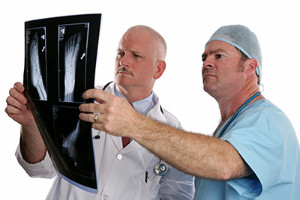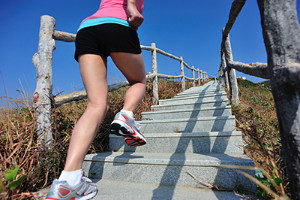Blog
Summertime Foot Care Tips
 Now that the warm weather is starting to approach us, you may be tempted to start wearing open toed shoes. However, it is important that you take good care of your feet so that you can be confident while wearing your favorite sandals this summer. Getting rid of the dead skin that may have built up during the winter months should be one of the first steps you take toward improving your foot health. This can be done via the natural route by using sea salt or grape seeds as exfoliants. If you still have dead skin on your feet after exfoliating, you may want to seek the assistance of a podiatrist for treatment. Another tip to have healthy feet is to make sure your toenails are cut straight across, instead of in a rounded shape. You should try to make an effort to trim your toenails every two to three weeks.
Now that the warm weather is starting to approach us, you may be tempted to start wearing open toed shoes. However, it is important that you take good care of your feet so that you can be confident while wearing your favorite sandals this summer. Getting rid of the dead skin that may have built up during the winter months should be one of the first steps you take toward improving your foot health. This can be done via the natural route by using sea salt or grape seeds as exfoliants. If you still have dead skin on your feet after exfoliating, you may want to seek the assistance of a podiatrist for treatment. Another tip to have healthy feet is to make sure your toenails are cut straight across, instead of in a rounded shape. You should try to make an effort to trim your toenails every two to three weeks.
Everyday foot care is very important to prevent infection and other foot ailments. If you need your feet checked, contact one of our podiatrists from Pennsylvania. Our doctors can provide the care you need to keep you pain-free and on your feet.
Everyday Foot Care
Often, people take care of their bodies, face and hair more so than they do for their feet. But the feet are a very important aspect of our bodies, and one that we should pay more attention to. Without our feet, we would not be able to perform most daily tasks.
It is best to check your feet regularly to make sure there are no new bruises or cuts that you may not have noticed before. For dry feet, moisturizer can easily be a remedy and can be applied as often as necessary to the affected areas. Wearing shoes that fit well can also help you maintain good foot health, as well as making it easier to walk and do daily activities without the stress or pain of ill-fitting shoes, high heels, or even flip flops. Wearing clean socks with closed shoes is important to ensure that sweat and bacteria do not accumulate within the shoe. Clean socks help to prevent Athlete’s foot, fungi problems, bad odors, and can absorb sweat.
If you have any questions please feel free to contact one of our offices located in Plymouth Meeting and Ambler, PA . We offer the newest diagnostic and treatment technologies for all your foot and ankle needs.
Tips for Dealing with Athlete’s Foot
 Athlete’s foot is a contagious fungal infection that can spread to the toenails and hands. The condition itself may be hard to cure, and it can be caught by direct contact with someone who has it or by touching surfaces that have been contaminated with it. The fungus has been found to thrive in damp environments such as showers, locker room floors, and around swimming pools. If you want to avoid getting athlete’s foot, you should wash your feet with soap and water and dry them thoroughly, especially between the toes. You also should avoid sharing your socks with other people since this can help spread the fungus. Lastly, be sure to change your socks when your feet get sweaty, and wear shoes that are made from a breathable material.
Athlete’s foot is a contagious fungal infection that can spread to the toenails and hands. The condition itself may be hard to cure, and it can be caught by direct contact with someone who has it or by touching surfaces that have been contaminated with it. The fungus has been found to thrive in damp environments such as showers, locker room floors, and around swimming pools. If you want to avoid getting athlete’s foot, you should wash your feet with soap and water and dry them thoroughly, especially between the toes. You also should avoid sharing your socks with other people since this can help spread the fungus. Lastly, be sure to change your socks when your feet get sweaty, and wear shoes that are made from a breathable material.
Athlete’s foot is an inconvenient condition that can be easily reduced with the proper treatment. If you have any concerns about your feet and ankles, contact one of our podiatrists from Pennsylvania. Our doctors will treat your foot and ankle needs.
Athlete’s Foot: The Sole Story
Athlete's foot, also known as tinea pedis, can be an extremely contagious foot infection. It is commonly contracted in public changing areas and bathrooms, dormitory style living quarters, around locker rooms and public swimming pools, or anywhere your feet often come into contact with other people.
Solutions to Combat Athlete’s Foot
- Hydrate your feet by using lotion
- Exfoliate
- Buff off nails
- Use of anti-fungal products
- Examine your feet and visit your doctor if any suspicious blisters or cuts develop
Athlete’s foot can cause many irritating symptoms such as dry and flaking skin, itching, and redness. Some more severe symptoms can include bleeding and cracked skin, intense itching and burning, and even pain when walking. In the worst cases, Athlete’s foot can cause blistering as well. Speak to your podiatrist for a better understanding of the different causes of Athlete’s foot, as well as help in determining which treatment options are best for you.
If you have any questions please feel free to contact one of our offices located in Plymouth Meeting and Ambler, PA . We offer the newest diagnostic and treatment technologies for all your foot and ankle needs.
Falcon’s Julio Jones Undergoes Foot Surgery
 Julio Jones of the Atlanta Falcons has had several foot injuries throughout his career. He suffered two different foot fractures in 2011 and 2013, and is currently recovering from a bunion removal surgery that he had in March. Jones is three months into his rehabilitation timetable, and hopes to be ready by training camp in July. In regards to his injury Jones stated, “It was good just to be back out on the grass and just testing it out, I felt great. Just working my way into it; just easing into it.”
Julio Jones of the Atlanta Falcons has had several foot injuries throughout his career. He suffered two different foot fractures in 2011 and 2013, and is currently recovering from a bunion removal surgery that he had in March. Jones is three months into his rehabilitation timetable, and hopes to be ready by training camp in July. In regards to his injury Jones stated, “It was good just to be back out on the grass and just testing it out, I felt great. Just working my way into it; just easing into it.”
Foot surgery is sometimes necessary to treat a foot ailment. To learn more, contact one of our podiatrists of Pennsylvania. Our doctors will assist you with all of your foot and ankle needs.
When Is Surgery Necessary?
Foot and ankle surgery is generally reserved for cases in which less invasive, conservative procedures have failed to alleviate the problem. Some of the cases in which surgery may be necessary include:
- Removing foot deformities like bunions and bone spurs
- Severe arthritis that has caused bone issues
- Cosmetic reconstruction
What Types of Surgery Are There?
The type of surgery you receive will depend on the nature of the problem you have. Some of the possible surgeries include:
- Bunionectomy for painful bunions
- Surgical fusion for realignment of bones
- Neuropathy decompression surgery to treat nerve damage
Benefits of Surgery
Although surgery is usually a last resort, it can provide more complete pain relief compared to non-surgical methods and may allow you to finally resume full activity.
Surgical techniques have also become increasingly sophisticated. Techniques like endoscopic surgery allow for smaller incisions and faster recovery times.
If you have any questions please feel free to contact one of our offices located in Plymouth Meeting and Ambler, PA . We offer the newest diagnostic and treatment technologies for all your foot and ankle needs.
Why Blood Circulation is Important for Your Feet
 The most important function of our blood is to deliver oxygen from our lungs to the farthest parts of our body while removing carbon dioxide and other waste products. Hormones, immune cells, and signalling molecules all travel through the blood in order to support the body's vital processes. Poor blood circulation can occur as we age and is associated with various diseases. Numbness and tingling in the feet are common symptoms of poor blood flow. Coldness in the feet is also a symptom of poor blood flow since the blood is meant to keep the body at a stable, warm temperature. Lastly, foot pain may also be a sign of poor circulation. This may occur after standing or sitting down for a long period of time.
The most important function of our blood is to deliver oxygen from our lungs to the farthest parts of our body while removing carbon dioxide and other waste products. Hormones, immune cells, and signalling molecules all travel through the blood in order to support the body's vital processes. Poor blood circulation can occur as we age and is associated with various diseases. Numbness and tingling in the feet are common symptoms of poor blood flow. Coldness in the feet is also a symptom of poor blood flow since the blood is meant to keep the body at a stable, warm temperature. Lastly, foot pain may also be a sign of poor circulation. This may occur after standing or sitting down for a long period of time.
Poor circulation is a serious condition and needs immediate medical attention. If you have any concerns with poor circulation in your feet contact one of our podiatrists of Pennsylvania. Our doctors will treat your foot and ankle needs.
Poor Circulation in the Feet
Poor blood circulation in the feet and legs is can be caused by peripheral artery disease (PAD), which is the result of a buildup of plaque in the arteries.
Plaque buildup or atherosclerosis results from excess calcium and cholesterol in the bloodstream. This can restrict the amount of blood which can flow through the arteries. Poor blood circulation in the feet and legs are sometimes caused by inflammation in the blood vessels, known as vasculitis.
Causes
Lack of oxygen and oxygen from poor blood circulation restricts muscle growth and development. It can also cause:
- Muscle pain, stiffness, or weakness
- Numbness or cramping in the legs
- Skin discoloration
- Slower nail & hair growth
- Erectile dysfunction
Those who have diabetes or smoke are at greatest risk for poor circulation, as are those who are over 50. If you have poor circulation in the feet and legs it may be caused by PAD and is important to make changes to your lifestyle in order to reduce risk of getting a heart attack or stroke. Exercise and maintaining a healthy lifestyle will dramatically improve conditions.
As always, see a podiatrist as he or she will assist in finding a regimen that suits you. A podiatrist can also prescribe you any needed medication.
If you have any questions please feel free to contact one of our offices located in Plymouth Meeting and Ambler, PA . We offer the newest diagnostic and treatment technologies for all your foot and ankle needs.
